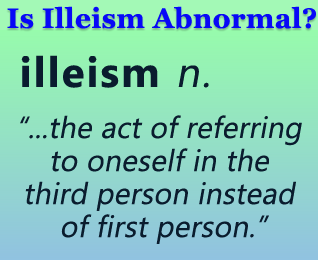 Illeism, also referred to self-talk, is the act of referring to oneself in the third person, by using one’s own name or other non-first-person pronoun, as if the words are coming from the perspective of another person.
Illeism, also referred to self-talk, is the act of referring to oneself in the third person, by using one’s own name or other non-first-person pronoun, as if the words are coming from the perspective of another person.
This subject recently gained much attention in mainstream news stories and commentaries focused on President Donald J. Trump, because he often referred to himself in the third person during his campaign. However, President Donald Trump is not the only known illeistic president or presidential contender.
Famous Illeists
On November 7, 1962, Richard M. Nixon stated, “You don’t have Nixon to kick around anymore because, gentlemen, this is my last press conference.” Although, it was not his last press conference.
During the 1996 presidential campaign, the media ridiculed Kansas Senator Bob Dole for his illeistic statements, and his illeism ultimately became the subject of several Saturday Night Live parody skits.
During the 2012 presidential campaign, contender Herman Cain used illeism on several occasions.
Many other successful people have notably spoken about themselves in the third person, including athletes such as:
- Dual sport star, Bo Jackson;
- Heisman Trophy winner, Cam Newton;
- Former World No. 1 tennis pro, Andre Agassi;
- Former professional boxer, Floyd Mayweather, Jr.;
- Baseball Hall of Famer, Rickey Henderson (a self-professed illeist)
- Professional wrestler Dwayne Johnson (The Rock)
- Four-time NBA champion, Shaquille O’Neal
- Professional basketball player LeBron James
In some cases, their third-person self-talk was captured on video, as seen in this clip of LeBron James.
Examples of illeism are commonplace in popular books, plays, and movies. Most notably, William Shakespeare used illeism in his works portraying the lives of Hamlet and Julius Caesar. There are a multitude of examples of illiesm within literary works, dating back through the ages, including by the translators of accounts compiled within the Bible.
Social Perceptions of Illeism
While most people do not use illeism in normal conversation, many people who hear someone engaging in it often perceive the individual as having a narcissistic personality or some type of dissociative disorder.
From a psychological perspective, a person in a clinical setting that speaks about themselves in the third person might certainly give reason for pause and consideration by a psychiatrist.
However, in motivational and self-help therapeutic situations, recent research reveals a very different perspective on it.
Significant Research on Illeism
In 2022, researchers explored the question, “Does stepping back to evaluate a situation from a distanced perspective lead us to be selfish or fair?” Their study and commentary were published in Scientific Reports: Distanced self-talk increases rational self-interest. They tested the effects of “adopting a third-person perspective on decision making in a task that pits rational self-interest against impartiality: the dictator game.” They provide some insight into spontaneous and goal directed self-talk and offer some interesting perspective on how self-talk might be beneficial.
In 2021, Sage Journals published a study that looked at using third-person self-talk in diary writing to promote “wise reasoning,” seeking to answer the question, “How can people wisely navigate social conflict?” Their findings in the study, Training for Wisdom: The Distanced-Self-Reflection Diary Method, suggest suggest that such a practice is an efficient and evidence-based method for fostering wise reasoning.
In 2014, the Journal of Personality and Social Psychology published Self-Talk as a Regulatory Mechanism: How You Do It Matters, a compilation of seven studies conducted by Ethan Kross, of the University of Michigan, along with eight other researchers, that exposed some surprising discoveries.
From the studies, Kross found that “small shifts in the language people use to refer to the self, during introspection, consequentially influences their ability to regulate their thoughts, feelings, and behavior under social stress, even for vulnerable individuals.”
According to the researchers, non-first-person self-talk is a form of self-distancing oneself to gain perspective and to think objectively about irrational thoughts. The concept has long been a primary factor in many cognitive and behavioral treatment methods. Also advocated by teachers of mindfulness and acceptance-based therapies, the practice of self-distancing enables a more clear observation of one’s feeling
The big take-away from Kross’ research is that the subtle linguistic shift from using “I” in self-talk to using one’s name, or other non-first-person pronouns, has great implications for powerfully positive effects.
Since conducting that study, Kross and his colleagues took their research farther by exploring more deeply the concept of self-distancing, Self-Distancing: Theory, Research, and Current Directions, which focuses on the role that self-distancing plays in facilitating adaptive self-reflection.
In a 2017, Psychology Today article, champion endurance athlete Christopher Bergland references the studies by Kross et. el, shares how using “Gutsy Third-Person Self-Talk” can help to maintain even-keeled emotion regulation and grace under pressure via your vagus nerve; a very interesting and extensive article!
Nonetheless, the stigmas associated with illeism will continue to endure until the growing research on third-person self-talk eventually changes the widespread misconceptions of it.
RELATED ARTICLES

Try this easy trick to overcome procrastinating! Dr. Carrington shares a “goal directed” self-talk strategy that can make even daunting tasks seem easier to begin and rewarding.
A New Self-Talk Strategy for Procrastination

Emotional Freedom Technique, also known as EFT, is a brilliant tool for clearing negative feelings that may be impeding your maximum performance, using gentle tapping and personally devised, goal directed self-talk statements.
Try Tapping to Improve Performance







I think using the third person in self talk is a good way to contact our observing self. It is a good way to see ourselves as others see us and to modify behaviour patterns we wish to change in ourselves. So also a good motivator. Saying to ourself, ” He procrastinates all the time,” instead of ” I am always procrastinating” is a far more powerful way of bringing about a change, even though saying it like this, so objectively can ne quite painful.